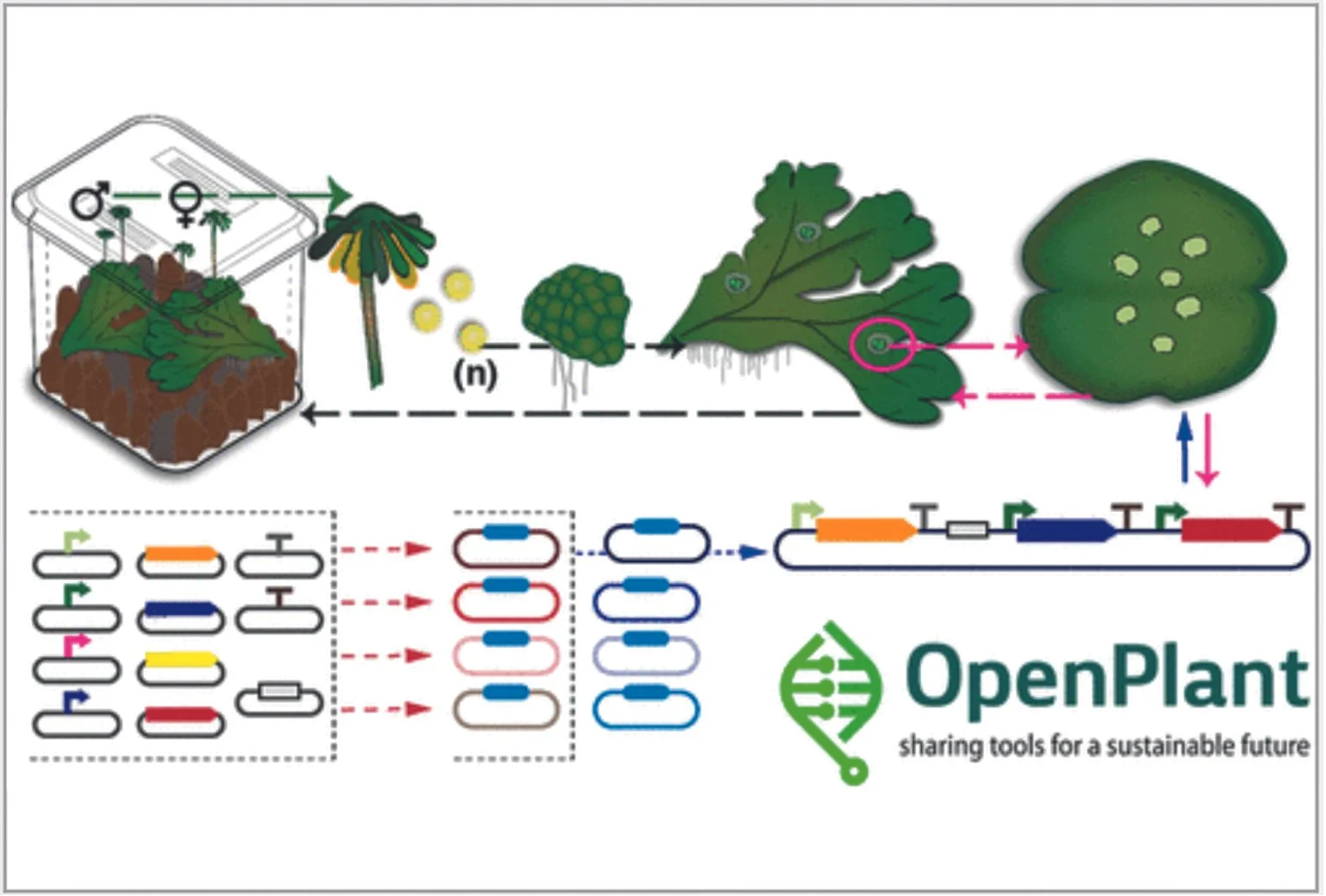
Stories from the University of Cambridge
OpenPlant kit
-
Eftychios Frangedakis, Susanna Sauret-Gueto, Jim Haseloff
Department of Plant Sciences, University of Cambridge, Cambridge, UK
-
2020, 2021
-
Eftychios Frangedakis:
ef391@cam.ac.ukJim Haseloff:
jh295@cam.ac.uk -
Frangedakis E, Guzman-Chaves F, Rebmann M, Markel K, Yu Y, Perraki A, Tse SW, Liu Y, Rever J, Sauret-Gueto S, Goffinet B, Schneider H, Haseloff J. 2021. Construction of DNA tools for hyperexpression in Marchantia chloroplasts. ACS Synthetic Biology 10, 1651–1666.
Sauret-Gueto S, Frangedakis E, Silvestri L, Rebmann M, Tomaselli M, Markel K, Delmans M, West A, Patron N, Haseloff J. 2020. Systematic tools for reprogramming plant gene expression in a simple model, Marchantia polymorpha. ACS Synthetic Biology 9, 864–882.
-
https://www.openplant.org/
-
Biotechnology and Biological Sciences, Research Council Engineering and Physical, Sciences Research Council OpenPlant, Synthetic Biology Research Centre (UK)
ABOUT THE OPEN-RESOURCE
Background
Plant synthetic biology is a field where engineering principles are applied to design plants with new or enhanced characteristics. Plants are attractive organisms for synthetic biology for many reasons: they can “make their own food” through the photosynthetic process; can be cultivated in large scale at low cost; and have substantial secondary metabolism, that can be exploited to produce a wide range of bioproducts. Plants also have chloroplasts, the organelles where photosynthesis occur, that have the potential to support high levels of transgene expression. OpenPlant, a research initiative part of the UK Synthetic Biology for Growth Programme (additional information can be found here), brought together researchers from the University of Cambridge, John Innes Centre, and the Earlham Institute with the main goals of developing new tools and methods for plant synthetic biology. OpenPlant toolkit is one of the outcomes of the OpenPlant initiative. Eftychios Frangedakis, Research Associate in the Haseloff Lab and developer of OpenPlant toolkit explains that, “Marchantia polymorpha was selected as the liverwort testbed thanks to its simplicity as an experimental system.”
Function
OpenPlant toolkit consists of a series of resources and techniques that allow both nuclear and/or chloroplast engineering applications primarily in Marchantia, but potentially in other plant systems. The toolkit enables the establishment of common standards and the use of this simple plant as a testbed for synthetic biology.
Development process
As usual in science, there was a lot of trial and error during the development of OpenPlant toolkit. However, Eftychios points out that thanks to the simplicity of Marchantia as an experimental system, trouble-shooting was relatively straightforward.
Target user
Research groups around the world that work with plant systems, but also companies that focus on plant synthetic biology application.
Comparison to other technologies
The main difference of the developed tool is that it is open source, standardised, simple and efficient.
IMPACT
Current use
The OpenPlant toolkit has been adopted mainly by research groups in Europe, USA and Japan, as well as by a UK-based private company. Distribution of the toolkit was initially delayed due to the COVID-19 pandemic, however, more than 20 research groups are currently using the OpenPlant kit, and/or parts of the resource.
Open source choice
“We are strong advocates of open source because it makes science more accessible, reliable and it facilitates and enhances collaboration,” said Eftychios. He also explains that due to its open source approach, the distribution of OpenPlant toolkit has been much simpler and users are more willing to adopt the system.
GOING FORWARD - WHERE TO IN THE NEXT 3-5 YEARS?
“We hope that the tools we developed will stimulate research in plant synthetic biology, promote standardisation practices and open science in general.”
Eftychios Frangedakis
Marchantia polymorpha with gemmae, used for asexual propagation © 2017, Prof Jim Haseloff, licensed under CC-BY 4.0. Reproduced from https://www.openplant.org/marchantia.
Marchantia life cycle for propagation in the laboratory (sexually through spores and asexually through gemmae). The OpenPlant toolkit contains the Loop assembly vector systems for nuclear and chloroplast transformation and genome editing in Marchantia. Reprinted with permission from ACS Synth. Biol. 2020, 9, 864–882. Copyright 2020 American Chemical Society.



